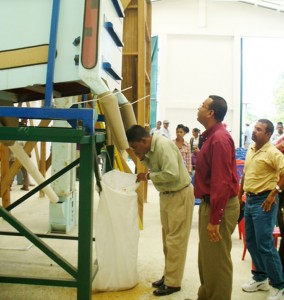With the commissioning of the $50M seed paddy facility at Lesbeholden, Black Bush Polder (BBP) on Wednesday, farmers would no longer have to travel far distances to access seeds for their crops.
The farmers told this newspaper that they are very pleased with its establishment as it would increase the quality of the seeds. They said they would no longer have to “soak the paddy and wind it out; that was too much work. Now the facility would do that and make it easier.”
The farmers also said that at first they had a difficulty in finding a place to dry their paddy and are pleased that a spot has been provided right next to the facility for that purpose.
In delivering the feature address at the commissioning ceremony, Minister of Agriculture, Robert Persaud said that “the facility would augment the seed production facility of our country.”
 He said there has been an increase in the acreage of rice under cultivation, noting that the quality of the seeds must be good to guarantee higher yields and better quality.
He said there has been an increase in the acreage of rice under cultivation, noting that the quality of the seeds must be good to guarantee higher yields and better quality.
He noted that similar facilities have been established at Anna Regina in Essequibo, Crane in West Demerara and at Leguan. He said that the one at Black Bush would not be the only one in Region Six and that soon another one would be constructed in the Number 52 to 74 area.
He said farmers in Berbice were complaining of not getting seeds on time for their crops or about getting poor quality. According to him there is a lot of positive development taking place in the local rice industry. The last two crops, he said, farmers got better prices than many years before.
He is confident that the price would not go back to the previous level but urged farmers to be committed, ensure that they follow technical advice and have better management of their cultivation area. He said the cost of production is going up and would take a severe toll on farmers’ ability to expand. He told the farmers that government is looking to alleviate some of the problems such as the price for fertilizers.
According to him, government has looked at ways to do so and would come up with some arrangement that would bring relief. He pointed out that Prime Minister, Samuel Hinds recently returned from the Petro Caribe Summit in Venezuela where one area of discussion dealt with the sourcing of affordable fertilizer. He said follow-up meetings would be held this month-end to look at ways, initiatives and areas to assist farmers to capitalize on productivity.
Persaud mentioned the issues with one miller taking a long time to pay farmers for paddy and said if the situation continues it can be “a form of economic sabotage.”
He said government is viewing the situation very seriously and that even though it was compelled by the court to reverse its action to suspend the licence of the Mahaicony Rice Mill they are looking at other ways to ensure that when millers buy paddy they pay.
Meanwhile the minister complimented the region for improving the BBP area and noted that the “complaints [by farmers] have been less.”
He said that through the support of the National Drainage & Irrigation Autho-rity, 61 farmers have benefited from empoldering. An excavator is currently working in the area and another [as well as other machineries] would be sourced soon.
General Manager of the Guyana Rice Development Board, Jagnarine Singh remarked that Region Six was having the lowest rice yield per acre but it has since increased. He is confident that the facility would help the yield to be even better and that it would provide a link to the research station.
President of the Rice Producers Association, Lekha Rambrich hopes that the region can increase the cultivation acreage from 35,000 acres to 60,000 acres.
He reiterated that a major concern for farmers is when millers fail to make payments and said the RPA would “put pressure to ensure that they pay on time.”
Also making brief remarks were Member of Parliament, Donald Ramotar and Dr. Oudho Homenauth, director of the National Agricultural Research Institute. The function was chaired by regional chairman, Zulfikar Mustapha.
At the end of the event seeds and plants were distributed to the farmers to assist in the ‘Grow More Food” campaign initiated by the Ministry of Agriculture.





